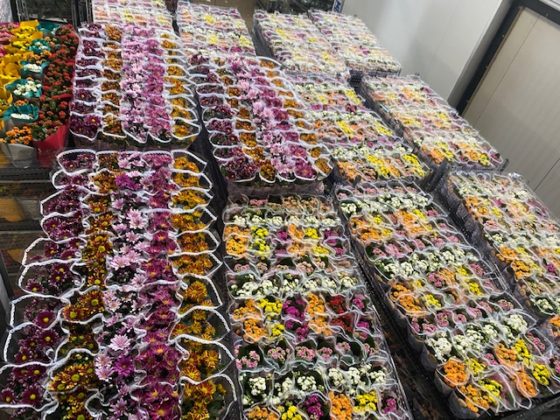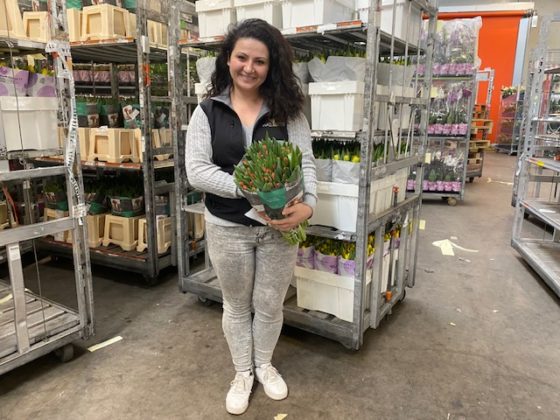Dutch-Ukrainian flower exporter torn between her business and war


The Netherlands is the world’s leading flower exporter. Many of its flowers end up in Eastern Europe, particularly around March 8, International Women’s Day, when people in the region traditionally give flowers to the women in their lives. But with war raging in Ukraine and economic sanctions against Russia, this year is very different, writes Lauren Comiteau.
Greenhouses dot the landscape as far as the eye can see on the way into the small town of Honselersdijk. This is flower growing country. Flower and plant exporter Flowerportal is just one of the many exporters attached to the Royal FloraHolland auction here, and normally at this time of year, it’s a hive of activity as trucks are being loaded with freshly cut flowers purchased in the morning and shipped out to the East by afternoon.
But on this Wednesday, about one week into the war in Ukraine, the loading dock is empty and the parking lot is eerily quiet. Westland has been dubbed ‘Wasteland’ by many who work here.
And the loading dock is not the only thing that’s empty.
Warehouse
‘This is where we keep the flowers,’ Christina van der Voort, director of Flowerportal, says while walking through the company’s cavernous warehouse. ‘This should be full. But now you see only empty buckets. Just a few days ago, we didn’t have space to walk. Now, you can see how much space there is.’ Many of the flowers that remain are orchids, tulips and chrysanthemums that have returned after her trucks did an about-face in Poland when war broke out.
Flowerportal does 90% of its business with Eastern European countries—including Russia and Ukraine. And most of that business comes in the few weeks between Valentine’s Day on February 14 and International Women’s Day on March 8.
International Women’s Day
‘This holiday exists from the Soviet times. It’s a beautiful day,’ says Van der Voort. ‘All women should get flowers. It’s even more popular than Valentine’s Day. Without this day, Russia and Ukraine would never be such big markets. East Europe, actually.’

During this high season, Van der Voort sells some 2-3 million stems—10 times more flowers per day than at any other time. But ever since war broke out, she can’t fulfill her orders. Ukraine is under siege, and economic sanctions against Russia mean she can’t receive any payments.
But Van der Voort also has a personal stake in the conflict. Although raised in the Netherlands, she is Ukrainian. Now, like many in the industry, she’s torn between saving her business and her humanitarian concerns.
‘I don’t have any emotions anymore. All is dead inside me,’ she says. ‘The biggest difficulty I have is that we can’t help. We can just listen and hear what’s happening. My Russian clients don’t even believe there’s a war. It’s really difficult to ask your clients everyday if they’re still alive instead of asking if they want flowers or how business is going.’
Flower growers
In this vast complex where perishable flowers are moved at warp speed from the attached auction house to exporters daily, everyone is feeling the pain. For growers like Wouter Duijvesteijn, who co-owns Beyond Chrysant with his brother and specializes in the Eastern European favourite chrysanthemums, it is the sky-rocketing price of electricity for his energy-intensive crop that is most worrying.
‘Gas turbines are one of the main power sources for electricity in the Netherlands,’ he says. ‘So, when gas prices go up 500%, so does electricity. Many nurseries decided to cut business by about half. I had that issue, too, but I hoped the high flower prices could cover costs.’
He’s referring to the past couple of years, when pandemic lockdowns led to exorbitant plant and flower prices as housebound people sought to update their gardens and beautify their homes with greenery. Now, he’s worried that the price of flowers will collapse.
‘Because of the uncertain situation in Russia and the loss of the entire Ukrainian market, there is less demand and prices will go down,’ says Duijvesteijn, who sells 75% of his flowers to Eastern Europe and makes one-fifth of his annual revenue from International Women’s Day.

‘I’m not the type to worry,’ he says. ‘But when I’m honest and look at the facts, it is really worrying.’
Matthijs Mesken, director of VGB, the Dutch Association of Wholesalers in Floricultural Products, is admittedly uncomfortable talking about flowers and plants during a war but he admits the industry is in for a troubling few months. ‘Some growers will have to decrease their production, go dark, which means less flowers coming to market and not enough stems. That hurts exports.’
Sanctions
‘In the Netherlands, the export of flowers is a huge market. It’s also very important for the image of the Netherlands, like cheese,’ says lawyer Heleen over de Linden, who’s also an expert on Russian sanctions.
While products such as Dutch cheese and vegetables have already been under sanctions since Russia annexed Crimea in 2014, this is a first for flowers. Over de Linden says other Dutch sectors— such as IT, consultancies and cars—could be next to feel the effects of what she calls today’s ‘unprecedented sanctions’.
‘Now with the exclusion of Swift and the asset freeze on the Russian central bank — these are huge sanctions that have never been done before, not even in Iran or Syria. They are really important sanctions, and you can see everyone is in a panic. The system is really collapsing now.’
No one here expects the flower market to completely collapse. Flowers and plants to Russia and Ukraine account for only some 3% of the Netherlands’ total flower exports.
But for Van de Voort, whose business depends on that Eastern trade, these are dark and uncertain times.
‘Someone told me the flower is the most innocent product you can buy and sell,’ she says. ‘It only delivers happiness and love and friendship. And now even getting flowers into those countries is difficult. No one needs them, and that’s scary.’
Thank you for donating to DutchNews.nl.
We could not provide the Dutch News service, and keep it free of charge, without the generous support of our readers. Your donations allow us to report on issues you tell us matter, and provide you with a summary of the most important Dutch news each day.
Make a donation